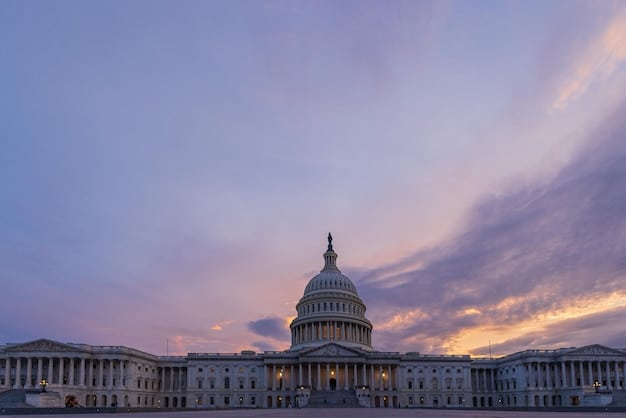Super PACs in US Elections: Funding and Influence Deep Dive

Super PACs play a significant role in US elections by raising and spending unlimited amounts of money to support or oppose candidates, operating independently from campaigns but profoundly influencing political discourse and outcomes through their financial activities.
The influence of money in politics is a long-standing debate, and Super PACs, or independent expenditure-only committees, have become a focal point of this discussion. These organizations can raise and spend unlimited amounts of money to advocate for or against political candidates, offering both opportunities and challenges to the democratic process.
Understanding Super PACs
To fully grasp the role of Super PACs in US elections, it’s essential to understand what they are and how they operate. These entities, officially known as independent expenditure-only committees, emerged following significant changes in campaign finance laws.
Super PACs are distinct from traditional political action committees (PACs). While both can raise money to support political causes or candidates, Super PACs face no limits on their fundraising or spending, as long as they do not directly coordinate with a political campaign or candidate.
The Genesis of Super PACs
The emergence of Super PACs can be traced back to the 2010 Supreme Court decision in *Citizens United v. Federal Election Commission*. This ruling held that corporations and unions have the same First Amendment rights as individuals, paving the way for unlimited independent expenditures in political campaigns.
Key Differences from Traditional PACs
- Contribution Limits: Traditional PACs are subject to contribution limits on the amount of money they can receive from individuals, unions, and corporations. Super PACs face no such limits.
- Spending Restrictions: Traditional PACs can donate directly to campaigns, but their contributions are capped. Super PACs cannot donate directly to campaigns but can spend unlimited amounts on independent expenditures.
- Coordination: Traditional PACs and campaigns can coordinate their activities to some extent. Super PACs are legally prohibited from coordinating with candidates or campaigns.
In essence, Super PACs operate independently of campaigns, using financial resources to influence voters through various means, such as television ads, digital campaigns, and grassroots mobilization efforts.

In conclusion, Super PACs are powerful financial entities in US elections that can significantly impact voter behavior and election outcomes due to their ability to raise and spend unlimited funds on advocacy.
The Impact on Campaign Finance
Super PACs have significantly reshaped the landscape of campaign finance in the United States. Their ability to raise and spend unlimited amounts of money has altered the dynamics of political campaigns and created new opportunities for special interests to influence elections.
One of the primary ways Super PACs impact campaign finance is through independent expenditures. These expenditures can take many forms, from television ads to digital campaigns, and are designed to influence voters without directly coordinating with a candidate or campaign.
The Role of Independent Expenditures
Independent expenditures allow Super PACs to amplify their message and reach a wider audience than a campaign might be able to on its own. These expenditures can be used to promote a candidate’s strengths or highlight an opponent’s weaknesses.
The Influence of Wealthy Donors
Super PACs often rely on a small number of wealthy donors for the bulk of their funding. This raises concerns about the potential for undue influence by these donors on elected officials and public policy.
- Access to Politicians: Large donors may gain privileged access to politicians and policymakers, giving them an outsized voice in government decision-making.
- Policy Priorities: Elected officials may be more responsive to the concerns of their wealthy donors than to the needs of average citizens.
- Erosion of Trust: The perception that wealthy donors are buying influence can erode public trust in the political system.
The impact on campaign finance is undeniable. These entities have given a megaphone to wealthy donors, allowing them to shape the narrative and influence election outcomes, which can undermine the principles of a fair and balanced democratic process.

Arguments For and Against Super PACs
The existence of Super PACs has sparked debates about their role in American democracy. Proponents and opponents of Super PACs present compelling arguments that reflect differing perspectives on free speech, political participation, and the integrity of the electoral process.
There are arguments that support Super PACs. Some argue that they are an exercise of free speech rights guaranteed by the First Amendment. The ability to spend money on political advocacy is seen as a fundamental right.
Arguments in Favor of Super PACs
Advocates contend that Super PACs allow different voices to be heard in the political arena. They can provide a platform for individuals and organizations to express their views and support causes they believe in.
- Promoting Free Speech: The First Amendment protects the right to political expression, and Super PACs allow individuals and organizations to exercise this right through independent expenditures.
- Increasing Voter Awareness: Super PACs can help inform voters about candidates and issues through advertising and other means, leading to more informed decisions at the ballot box.
- Enhancing Political Participation: Super PACs can encourage political participation by giving individuals and organizations a way to support candidates and causes they believe in, even if they cannot donate directly to campaigns.
Arguments Against Super PACs
Critics argue that Super PACs amplify the voices of wealthy donors and special interests, drowning out the voices of average citizens. This can lead to policy outcomes that benefit the few at the expense of the many.
Super PACs can engage in negative campaigning, attacking candidates and distorting their records. This can discourage qualified individuals from entering politics and turn off voters.
Ultimately, weighing the arguments for and against reveals a complex issue at the heart of American democracy, reflecting the balance between free speech and fair representation.
Super PACs and Election Outcomes
The influence of Super PACs on election outcomes is a subject of intense scrutiny and debate. These organizations spend vast sums of money to influence voters, raising questions about whether their financial power can sway election results.
One of the primary ways Super PACs try to influence election outcomes is through advertising. They produce and air television, radio, and digital ads designed to promote or attack candidates.
Impact on Voter Behavior
- Shaping Public Opinion: Super PAC ads can influence public opinion by highlighting a candidate’s strengths or weaknesses, or by attacking their opponent’s record.
- Mobilizing Voters: Super PACs can mobilize voters through get-out-the-vote efforts, encouraging them to turn out on Election Day.
- Influencing Turnout: Studies have shown that Super PAC spending can affect voter turnout, with some research suggesting that it can both increase and decrease turnout depending on the context.
Case Studies
Examining specific elections where Super PACs played a significant role can provide insights into their potential impact on election outcomes.
Consider the 2012 presidential election: Super PACs spent hundreds of millions of dollars to support or oppose candidates. While it’s difficult to isolate the precise impact of Super PAC spending, many observers believe it played a significant role in shaping the narrative and influencing voter behavior.
Super PACs have the potential to be decisive forces that alter the trajectories of electoral contests, shaping policy outcomes and the direction of the country.
Regulation and Reform Efforts
The proliferation of Super PACs and the escalating influence of money in politics have spurred calls for regulation and reform. Advocates for campaign finance reform seek to address the perceived imbalances and inequities created by Super PACs.
One of the primary goals of campaign finance reform is to limit the influence of money in politics. Proponents argue that this can be achieved through various means, such as:
Proposed Reforms
- Contribution Limits: Reinstating or strengthening contribution limits for individuals, unions, and corporations would reduce the influence of wealthy donors on Super PACs.
- Disclosure Requirements: Requiring Super PACs to disclose their donors in a timely manner would increase transparency and accountability.
- Coordination Rules: Strengthening the rules against coordination between Super PACs and campaigns would prevent Super PACs from becoming shadow arms of campaigns.
Challenges to Reform
Efforts to regulate or reform Super PACs face significant challenges. Opponents argue that such measures would violate the First Amendment rights of free speech and association.
Another challenge to reform is the lack of political consensus. Democrats and Republicans hold different views on the role of money in politics, making it difficult to reach a compromise on campaign finance reform.
The path to reforming campaign finance is fraught with obstacles, highlighting the deeply entrenched nature of money in politics and the constitutional protections afforded to free speech.
The Future of Super PACs
Looking ahead, it is essential to consider the potential trajectory of Super PACs and their role in future elections. Several factors could shape the future of these organizations and their influence on American politics.
Legal challenges could lead to further changes in campaign finance law. The Supreme Court could revisit its decision in *Citizens United* or other key rulings, potentially altering the legal landscape for Super PACs.
Possible Scenarios
Technological advancements could also impact the future of Super PACs. Online advertising and social media could become increasingly important tools for Super PACs to reach voters.
Changes in public opinion could also affect the future of Super PACs. If voters become increasingly disillusioned with the role of money in politics, there could be greater pressure on elected officials to enact campaign finance reform.
- Increased Regulation: Congress could pass legislation to regulate or restrict Super PACs, such as imposing contribution limits or strengthening disclosure requirements.
- Grassroots Activism: Grassroots organizations could mobilize voters to support candidates who are committed to campaign finance reform.
- Constitutional Amendment: Proponents of reform could pursue a constitutional amendment to overturn *Citizens United* and clarify the role of money in politics.
The future role of Super PACs in US elections remains uncertain, but one thing is clear: as long as money is seen as speech, these entities will continue to shape our political landscape.
| Key Point | Brief Description |
|---|---|
| 💰 Super PACs | Raise unlimited funds for political advocacy. |
| ⚖️ Citizens United | Supreme Court ruling enabling Super PACs. |
| 📢 Independent Expenditures | Spending to influence voters, without campaign coordination. |
| 🗳️ Election Outcomes | Super PACs can impact voter behavior and results. |
Frequently Asked Questions
▼
Super PACs are independent political committees that can raise unlimited sums of money from corporations, unions, and individuals, but are not allowed to directly coordinate with political campaigns.
▼
Super PACs emerged following the 2010 Supreme Court decision in *Citizens United v. Federal Election Commission*, which allowed unlimited independent expenditures by corporations and unions.
▼
Traditional PACs have contribution limits and can donate directly to campaigns, while Super PACs have no contribution limits but cannot directly coordinate with or donate to campaigns.
▼
Super PACs influence election outcomes through independent expenditures like TV ads, digital campaigns, and grassroots efforts designed to support or oppose candidates.
▼
Potential reforms include reinstating contribution limits, strengthening disclosure requirements, and reinforcing rules against coordination between Super PACs and campaigns.
Conclusion
In summary, Super PACs represent a significant evolution in campaign finance, presenting both opportunities and challenges to the integrity of US elections. As they continue to shape political discourse and outcomes, ongoing debates over regulation and reform will be crucial in determining their future role in American democracy.





